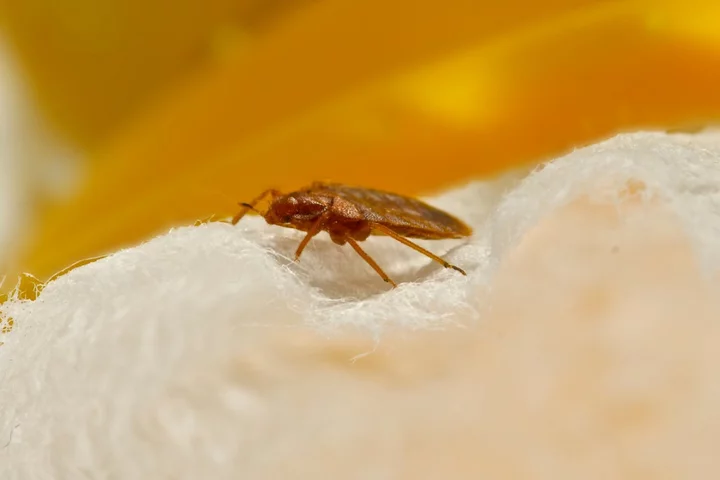
Actress Julia Ormond sues Harvey Weinstein and Disney over sexual assault
The Legends of the Fall star says her agents failed to protect her from the disgraced film mogul.
2023-10-05 04:19

Tampa Bay Rays stressed about Game 2? 'More focused on playing ping-pong' than worrying
ST. PETERSBURG, Fla. — The Tampa Bay Rays seem to enter Game 2 of their Wild Card series against the Texas Rangers channeling their inner Alfred E. Neuman. To p
2023-10-05 04:19

Brian Austin Green says he had stroke-like symptoms caused by his diet: ‘I couldn’t speak’
Brian Austin Green has revealed he suffered from stroke-like symptoms for four years that were ultimately caused by his diet. The Beverly Hills, 90210 alum, 50, recently opened up about his major health struggles - which included vertigo and ulcerative colitis - that led him to be bedridden for three months and unable to speak, read, or write. In an episode of the Sex, Lies, and Spray Tans podcast with Dancing With the Stars dancer Cheryl Burke, released on 2 October, Green revealed that it wasn’t until a “kinesiology and Eastern medicine” specialist discovered he had “internal inflammation” from his diet of gluten and dairy that he was able to take control of his health. “I spent four and a half years recovering from stroke-like symptoms without ever having had a stroke,” the Anger Management star said. “I couldn’t speak. I couldn’t read. I couldn’t write.” When asked by podcast host Burke if his “neurological” issues were a result of having vertigo - a sensation that the environment is spinning in circles - Green explained that his vertigo symptoms were just “one stage” of his health problems. “I had ulcerative colitis and then I had vertigo,” he said. According to the Mayo Clinic, ulcerative colitis is an inflammatory bowel disease that causes inflammation and ulcers in the digestive tract. “I was bedridden for like three months but both things were undiagnosable,” he continued. “Nobody could figure it out, all the specialists that I saw.” Burke asked whether his symptoms were a result of a car accident, seemingly referring to when Green and his ex-wife, Megan Fox, were struck in their vehicle by a drunk driver in December 2014. “No. It was dietary,” he replied. Despite getting an opinion from one of the top neurologists at Cedars-Sinai Medical Center in Los Angeles, and undergoing nearly 200 blood tests and two MRIs, his doctor was still unsure of what Green’s health issue could be. The actor recalled that his symptoms of “brain fog” were so bad that he once reintroduced his best friend of 25 years to his sister, who his friend had also known for more than two decades. Green shared that even reading Dr Seuss books to his children was difficult for his brain. “It was all undiagnosed by Western medicine, so I ended up having to finally find a doctor that is much more into, like, kinesiology and Eastern medicine,” he said. Once finding a specialist, the doctor told Green that his health condition was a combination of stress and consuming “gluten and dairy”, which caused “internal inflammation” in his system. These days, Green shared that he’s “fully recovered” from his stroke-like symptoms and his health has been “100 per cent” since then. Green is a father to five children. He shares son Kassius Lijah, 21, with ex-girlfriend Vanessa Marcil. The Desperate Housewives alum also shares sons Noah Shannon, 11, Bodhi Ransom, nine, and Journey River, seven, with ex-wife Fox. He and the Jennifer’s Body star were married from 2010 to 2021. In June 2022, Green welcomed his fifth child, son Zane Walker, with fiancée Sharna Burgess. Read More Brian Austin Green gets candid about how great co-parenting is with ex Megan Fox Brian Austin Green shuts down claim he’s a ‘bad father’ after defending Megan Fox over sons’ outfits Megan Fox hits back at US politician’s claim about her children’s clothes Woman reveals how she discovered she’s allergic to water More than a quarter of middle-aged women living with ‘metabolically healthy obesity’ – study Idris Elba reveals he’s been in therapy for over a year after work realisation
2023-10-05 00:58

NFL Week 5 Byes: Every team that’s off this week
Four teams have a bye in Week 5 of the 2023 NFL season.
2023-10-05 00:51

Four takeaways from Real Madrid's thrilling Champions League win over Napoli
Four takeaways and analysis of Real Madrid's 3-2 win over Napoli in the Champions League, inspired by another superb performance from Jude Bellingham.
2023-10-04 22:22

How can Man Utd reach the Champions League knockout stages?
Just when you think it can't get worse for Manchester United, it just sort of... does. Erik ten Hag done some excellent work during his debut season to return
2023-10-04 20:47

More than a quarter of middle-aged women living with ‘metabolically healthy obesity’ – study
Almost one in 10 middle-aged men and more than a quarter of middle-aged women in the UK are “fit but fat”, researchers have said, as they called for more to be done to help people reduce their weight. Academics said that there are large regional differences over levels of “metabolically healthy obesity”, which could be down to different diets or other lifestyle factors as well as ethnic and genetic differences. People who are “fit but fat” are considered to be obese by their body mass index (BMI) score but have none of the complications associated with obesity including abnormal blood sugar levels; high cholesterol; high blood pressures; type 2 diabetes or other signs of heart disease. The UK has similar levels seen in Sweden, Norway and Germany, experts said. The highest proportion of metabolically healthy obesity is observed in France and other Mediterranean countries such as Italy and Israel, experts told the the Annual Meeting of the European Association for the Study of Diabetes. There will always be people living with obesity who seem to be protected against obesity-related cardiometabolic diseases Prof Mattias Bluher One study shows that 8% of men and 27% of women in the UK aged between 40 and 50 are living with “metabolically healthy obesity”. Asked how many people in the UK are affected, Professor Matthias Bluher, of the University of Leipzig and Helmholtz Centre Munich in Germany, said: “The (UK) is very similar to situation Sweden, Norway and Germany. “There are populations in Micronesia or Asian populations where it is down to 2-5% only. “Some populations may be, despite large amounts of adipose tissue, better protected against comorbidities and Caucasian populations belong to those.” Prof Bluher said that healthy obesity is seen in a number of premenopausal women. It comes as Prof Bluher called for better weight management programmes for people who fit the profile. He pointed to previous work which suggests people who are “healthy obese” have a higher risk of coronary heart disease, cerebrovascular disease and heart failure compared to their in a normal weight range. “There will always be people living with obesity who seem to be protected against obesity-related cardiometabolic diseases,” he told the conference. “The concept that metabolically healthy obesity affected people may not benefit from weight loss strategies has been challenged by recent data. “A timely and personalised treatment of obesity should also be recommended to people living with healthier obesity.” Read More Charity boss speaks out over ‘traumatic’ encounter with royal aide Ukraine war’s heaviest fight rages in east - follow live Jonnie Peacock on Strictly Come Dancing representation: ‘It’s important to break people’s perceptions’ What you need to know about depression during menopause – as Carol Vorderman opens up Autumn pests to look out for and how to get rid of them in your home and garden
2023-10-04 16:50

Jonnie Peacock on Strictly Come Dancing representation: ‘It’s important to break people’s perceptions’
BBC One’s Strictly Come Dancing has been “fantastic” for disability representation, says Jonnie Peacock MBE – the show’s first amputee contestant. The sprinter and paralympian, who was partnered with professional dancer Oti Mabuse in 2017, helped pave the way for celebrities with disabilities, including presenters Rose Ayling-Ellis and JJ Chalmers. The new 2023 series sees cyclist and swimmer Jody Cundy – who, like Peacock, had his right leg amputated just below the knee – compete with Jowita PrzystaÅ‚, who lifted the glitterball trophy last year with Hamza Yassin. “For me, going on Strictly was important to attempt to break people’s perceptions and make them realise the reason that I would be a bad dancer would absolutely not be my leg,” says the 30-year-old. “My leg is actually one of my strong suits! “Rhythm,” he laughs, “That was more the problem.” Peacock – who became a household name after smashing the world record and claiming gold in the 100m T44 final at London 2012 Paralympic Games – said by appearing on the popular dancing show, he was “trying to get people to understand that we look at someone and we instantly judge what they’re able to do, and put them in a box”. The World Health Organisation estimates that 16% of the world’s population is disabled. “But when you look at your TV – especially 20 years ago – it [looked like] 0.1%, and the same with race and gender,” notes Peacock. “Now people are starting to realise that we want our world to be reality, and we want our [TV] world to encompass what it actually looks like. “It’s not just Strictly, pretty much all of the reality TV shows have disabled contestants in [now]. It’s so important. It’s a way to show that we are an individual, and that we have something to give.” Peacock was recently made an ASICS ambassador (“It’s really cool to be working with a brand who actually care about a lot of the things I care about – that it’s so much more than sport,” he says). And after a difficult summer on the track, he’s looking ahead to the indoor winter para season and the Paris Paralympics next summer. “I felt the worst I’ve felt in years, as soon as I got past 50 or 60 metres [during Paris Para Athletics World Championships in July],” says the sprinter, who later discovered he had hamstring tendinopathy. “I’d kind of lost the love of the event. Even though I love training, I didn’t enjoy competing too much. Even though I love doing it, it was bringing me a lot of misery.” As well as injury niggles, he’s been having issues with the alignment of his prosthetic blade. For para athletes, this technical side of the sport adds additional complication. “I used to love that, but there was a couple of years where I just felt off balance and didn’t realise why,” he says. “We had to play with so many different settings… that was the moment where I was constantly [thinking], ‘I wish I had a foot there where it should be, I wish I didn’t have to worry about setting this up and could just go for it’.” Peacock was five when he almost died from meningitis and his right leg had to be amputated – a time he has few memories of (“I have one flashback in the back of the car being rushed to hospital, with my Power Rangers duvet wrapped around me”). Growing up, he had several bone revision surgeries – “because once you’ve had an amputation, the bone will carry on growing,” explains Peacock. Now though, he’s showing no signs of slowing down, even though sprinter careers are notoriously short. For the next Paralympics, “It’s gold or nothing – Felix [Streng of Germany] has got it now [after Tokyo 2020], but my plan is to hopefully make him the shortest Paraylmpian champion ever.” After being so dominant in the 100m for so long (he’s a two-time Paralympic gold medalist, two-time world champion, and two-time European Championship gold medalist), what keeps him motivated to win? “It’s probably greed,” he laughs, “It’s just never enough, you just want more, it’s an addictive feeling. It’s like you’re just constantly chasing to try be a better athlete – a better version of you.” And with age has come a better understanding of how his own happiness and mental health is tied to his physical health. “I don’t exercise for a period of time, I can get a little bit almost, not depressed, but edging on that, just not happy, very lethargic,” he reveals. Youth comes with a blissful naivety about health, he says. Before, “I never really realised that every time I exercised, I felt better afterwards. Now [my body] is more sensitive. I don’t feel fantastic 24/7, creaks and aches start to appear, grogginess, fatigue…” These days, when he’s not feeling his best, he’ll start a day with a 15-minute indoor bike session at home, where he lives with para athlete girlfriend Sally Brown. “I hate it, I literally hate it!” he laughs. “I want to sit on the sofa and watch TV [instead]. I feel atrocious for 10 minutes afterwards, but then I bounce up so high for the rest of the day, I’m so happy. “The closest thing that affects my mental health is my [physical] health. If I eat like crap, if I sleep like crap, if I don’t exercise, I will be in a bad mental health space. If I exercise, even just a little bit, if I eat well, if I sleep well, I don’t feel like that. It’s understanding there’s a cause and effect relationship to a lot of things.” He swears by the feel-good endorphins of a freezing cold shower everyday. “My friend told me about Wim Hof [the Dutch endurance athlete known as The Iceman] six or seven years ago. I hate hot showers now, to the point where I was in a hotel once and had to get the engineer to come up because the shower didn’t go cold [enough].” Peacock says he tries to remember that “life is a game” and “a gift”. He continues: “We waste it because we take it too seriously. And we’ve been forced to take it too seriously by the outside world – we’ve been given pressures, we’ve been given expectation, and you end up allowing the stress to enclose you and take you away from that childhood mentality of just going out and having fun. “When you’re dead, you’re not going to be sitting there going, ‘Oh, I wish I’d kept my boss a bit happier’.” Jonnie Peacock is sponsored by ASICS. To find out more visit asics.com. Read More Charity boss speaks out over ‘traumatic’ encounter with royal aide Ukraine war’s heaviest fight rages in east - follow live What you need to know about depression during menopause – as Carol Vorderman opens up Autumn pests to look out for and how to get rid of them in your home and garden How can I tell if my child has ADHD?
2023-10-04 15:26

How to get rid of bed bugs? The signs and symptoms as infestation could make its way from Paris to London
It was a not-so glamourous end to Paris Fashion Week, as a “widespread” outbreak of bed bugs caused panic and disgust in the French capital. Paris authorities sent out a public warning that “no-one is safe”, with the small insects making their way through the city. In recent weeks and months, there have been numerous sightings on public transport and other locations. “No one is safe. You can catch them anywhere and bring them home, and not detect them in time until they have multiplied and spread,” deputy mayor Emmanuel Grégoire, told French TV. Videos posted on social media show insects crawling over seats on the Paris Metro as well as appearing in huge numbers on cinema seats. Some users have also shared their experiences of being bitten by the critters. So, how can you help protect yourself against a bedbug infestation? Here’s everything you need to know. How do you know if you have bed bugs? To find out if you have bed bugs, it’s best to keep an eye out for two things: 1. Bites on your body – these look like little red marks that cause itchy welts. “These welts usually appear in a zigzag pattern,” the American Academy of Dermatology Association says. 2. You should always keep an eye out for signs of bedbugs, this includes odour, specks of blood on bedding, exoskeletons, tiny blackish specks and eggs. • Odour: If you notice a sweet or musty smell in your sleeping area, there might be a heavy infestation in the room, the AADA says. • Specks of blood: Look at your bedding, mattress and furniture – if you notice specks of blood anywhere, the insects might have made their way into your home. • Exoskeletons: The small insects have an outer shell that they shed and leave behind. Check for remains on your bedding, mattress and cushions. • Tiny blackish specks: The blackish specks are a sign of beg bug excrement. • Eggs: “After mating, female bed bugs lay white, oval eggs in cracks and crevices,” the AADA says on its website. These will be in the size of an apple seed, so keep your eyes peeled. How do I treat bedbug bites? The NHS says bedbug bites usually clear up on their own in a week or so but there are a few steps you can take to help you during your recovery process: • Put something cool, like a clean, damp cloth on the affected area to help with the itching and to ease off any swelling. • Be sure to keep the affected area clean to prevent any further infection. • Try your best not to scratch the affected area. You can also get steroid creams like hydrocortisone cream to ease bedbug bites. However, children under 10 and women who are pregnant should get advice from a doctor before using this cream. Another option would be to use antihistamines, these may help if the bites are very itchy and you’re unable to sleep, the NHS says. How to get rid of bed bugs – the do’s and don’ts It can be hard to get rid of the small insects on your own, so you might need to contact your local council or pest control service to get rid of the pesky creatures. Here are some steps you can take to reduce bed bugs: • Remove the affected bedding and clothing – wash on a hot wash of 60c and tumble try on a hot setting for at least 30 minutes. • You can also put the infested bedding and clothing in a plastic bag and place It in your freezer for 3 to 4 days. • It’s time to up your cleaning game – “bedbugs are found in both clean and dirty places, but regular cleaning will help you spot them early,” the NHS adds. Here’s what you should avoid doing: • Do not keep clutter around your bed, try to keep your space as clean as possible. • Do not bring second-hand furniture indoors unless you have cleaned and carefully checked it. • Do not take luggage or clothing indoors without checking it properly – especially if you have come from somewhere where you know there are bedbugs. What are the causes of bedbugs and where do they live? The wingless parasitic insects are found all around the world and may be linked to, more frequent travel, changes in pest control practices and insecticide resistance. Bedbugs can be found in: • Clothing • Luggage • Bedding • Boxes • Box springs • Mattresses • Headboards • Objects near beds According to the Mayo Clinic, they can also be found: • Under peeling pain or loose wallpaper • Under carpeting near baseboards • In upholstered furniture seams • Under light switch plates or electrical outlets Can bed bugs reach the UK? The short answer is yes… Bed bugs have a lifespan of between four to six months and are known to cling onto dirty suitcases – so it is possible that they may hitch a ride on the Eurostar which is just two hours away from London. The Independent’s Barney Davis asked David Cain, founder and MD of Bed Bugs LTD and a qualified microbiologist, whether the bugs could survive the journey. “Easily, yes, without a shadow of a doubt,” he responded. Read the latest on the bed bug infestation in Paris here. Read More Is London prepared for the mutant bedbug invasion that has swarmed Paris? That will bug you: Thousands of mosquitoes take over walls of bathroom Hotel worker shares tips on how to hunt out bed bugs How to get rid of bed bugs? Everything you need to know Idris Elba reveals he’s been in therapy for a year due to ‘unhealthy habits’ Having an overweight pet could cost owners over £1,000 in vets’ bills
2023-10-04 13:22

Baltimore police confirm an active shooter situation near Morgan State University
Baltimore police are responding to "an active shooter situation" near the campus of Morgan State University, the department said Tuesday night.
2023-10-04 10:45

MLB Playoffs: 1 mistake every Wild Card team made with their postseason roster
The wild card series of the MLB Playoffs are underway, but every team made at least one mistake with their postseason roster. MLB insider Robert Murray breaks down the blunder for each club.
2023-10-04 10:16

First pitch: 3 things I heard after Rangers-Rays Wild Card Game 1
The Texas Rangers logged a 4-0 win over the Tampa Bay Rays in Game 1 of the American League Wild Card series. Here's what I heard inside the clubhouses.
2023-10-04 10:16
